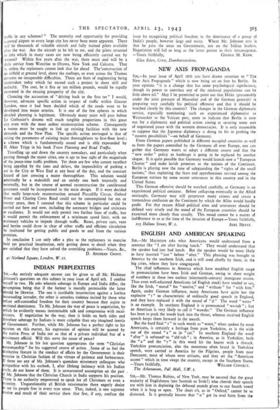ENGLISH AND AMERICAN SPEAKING
SIR,—Mr Macintyre asks what Americans would understand from a sentence like "I am after having lunch." They would understand that the speaker had just had lunch. But the speaker would be more likely to have inserted " just" before "after." This phrasing was brought to America by the southern Irish, and is still used chiefly by them, in the big cities, where they have congregated.
The chief influences in America which have modified English usage in pronunciation have been Irish and German, owing to sheer weight of numbers in those two earliest (nineteenth-century) immigrant strains. Thus even well-educated Americans (of English stock) have tended to say, like the Irish, " motuf " for " motive," and " withum" for " with him." Again, under German influence, many Americans have quite lost the explosive " t " so characteristic of ordinarily good speech in England, and they have replaced it with the sound of "d." The word " water " is an example. In southern England it is pronounced " wa-tuh "; but an American is very likely to call it " wawder." The German influence has been to push the words back into the throat, whereas received English speech keeps them forward in the mouth.
But the hard final "r " in such words as " water," when spoken by most Americans, is certainly a heritage from pure Yorkshire, as is the wide use of the sound " a " as in "cat." In southern England the word
"after" is softened- to " ahf-tuh" ; in America, as in Yorkshire, both the "a " and the "r " in this word hit the hearer with a thwack.
Yorkshire pronunciation, also the monotone often heard in Yorkshire speech, were carried to America by the Pilgrims, people from near Doncaster, most of whom were artisans, and they set the "American accent" which in time swept the country, except in the Southern States.
—Yours faithfully, WILLARD CONNEI.Y.
The Athenaeum, Pall Mall, S.W. r.


























 Previous page
Previous page